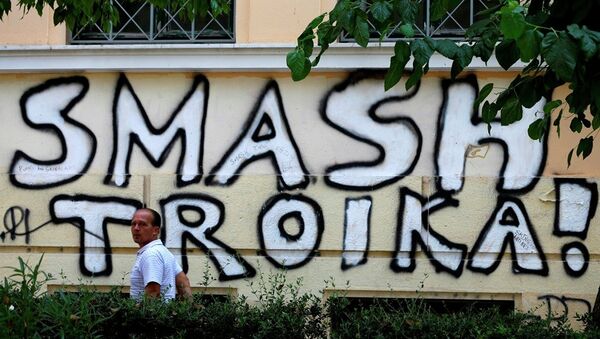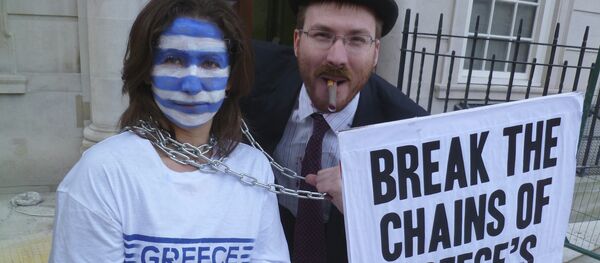Greece is currently negotiating its way through its third bailout agreement with its creditors – the IMF, the Eurozone and the European Central Bank (ECB) — otherwise known as the Troika. Having had to be rescued a third time, Greece is being given financial support in a series of tranches of money after meeting strict conditions on changes to its fiscal policy.
In short, Greece is being called on to make severe cuts to public services, while widening and increasing tax collection and making major reforms to its state pension system. The austerity measures are deeply unpopular and have led to demonstrations and strikes for years.
Lessons Learned
However, there are disputes between the Troika members over the sustainability of what Greece is being asked to do, with the IMF not putting any money into the third bailout, which it says in "unsustainable."
Zsolt Darvas, Senior Fellow at the Brussels-based think tank the Bruegel Institute told Sputnik:
"I think the IMF has learned the lessons from the previous two bailouts and concluded that it’s very unlikely that Greece will be able to maintain high levels of primary surplus in the next three or four decades, which is a presumption under the current third bailout program."
"Therefore, the International Monetary Fund proposed a much lower primary surplus target than what is in the third program. But that lower primary surplus would mean that the public debt would not be sustainable, so major debt reduction is needed."
"The IMF made that proposal, but the Eurogroup meeting a few weeks ago confirmed that the 3.5 percent primary surplus target must be met by Greece and I don’t really see how the IMF and the Eurogroup will be able to come to any form of compromise," Darvas told Sputnik.
https://t.co/8iuwE3TqQo An utter & total disgrace. The EU, IMF, ECB & European Commission are corrupt & hateful institutions! #GreekBailout
— Matthew (@seeker375) 10 May 2016
The senior analyst said the best thing to happen would be for the Eurozone and the ECB to roll up all Greece's debts to the IMF – from previous bailouts – and extend them a loan over decades, not years.
"In my view, the most likely scenario is that the IMF will not participate in the third bailout program – financially – and also what is quite likely is that Greece may buy back the existing IMF loans with a new loan from the European Stability Mechanism (ESM), which be very reasonable for two reasons," Darvas told Sputnik.
"The first is that the IMF loans are granted at a very much higher interest rate than the ESM loans. The IMF loan interest rate is around three or four percent, while the ESM can provide a loan at below one percent at the moment.
"The second reason is that the IMF loans have to be repaid by 2021 in full, while the ESM can grant a loan for three or four decades, so this would mean cheap financing for the next three or four decades," Darvas added.



